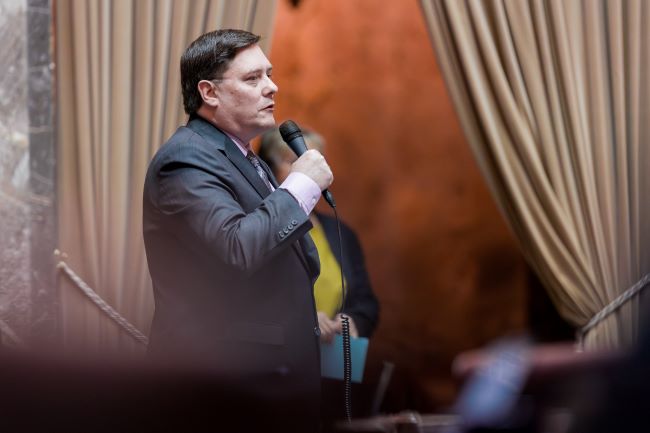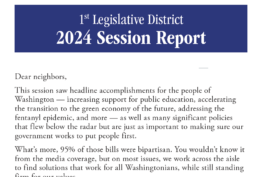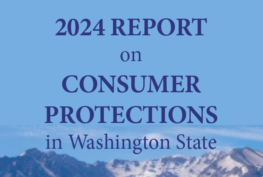Dear friends and neighbors,
We’re almost two-thirds of the way through the legislative session. The Senate is now considering House bills and vice versa.
Telephone town hall reminder
I hope you’ll join us for our telephone town hall this Monday. Phone calls will go out to people in the district at 6:30 p.m. All you have to do is answer! If you don’t get a call, you can dial in: (855)-756-7520 and use extension 120782#.
Bills on the move
Improving consumer protections
Several of my bills have passed through the Senate and are now being considered in the House, including one that ensures people have access to a transparent, equitable, and efficient appraisal process when filing an auto insurance claim. Over the past few years, more insurance estimates are either being written by artificial intelligence or someone merely looking at a picture. Unfortunately, this has meant customers are facing repair bills that far exceed the amount insurance companies offer as payment. SB 5721 would allow for a fairer dispute resolution process, so customers and insurance companies can come to a better agreement about the true cost of repairs.
Public school funding

Ensuring Washington’s 1.1 million students have the resources they need to thrive is our paramount duty as a state. I’m pleased the Senate recently passed two major K-12 education funding bills, which are now being considered in the House. SB 5192 will fill critical funding gaps school districts are facing for materials, supplies, and operating costs. SB 5263 will provide another $2 billion in the next four years for special education services for students.
Washington’s budget challenge: How did we get here?
In the coming days, the Senate will release its operating budget proposal. You may have heard our state faces a budget shortfall, and I want to explain why. It stems from economic shifts, rising costs and a tax system that doesn’t keep up with the needs of our growing state.
Our tax system is among the most regressive in the entire country — those making the least amount of money are paying a higher percentage of their income on taxes than our state’s wealthiest people. Washington’s tax system relies heavily on sales taxes, which fluctuate with consumer spending. Recent revenue forecasts have come in lower than expected, making it harder to sustain services Washingtonians rely on.
At the same time, it costs more to provide the services we all need. Inflation and population growth have driven up the price of health care, education, and housing assistance. More people than ever rely on these programs, increasing caseloads in early learning and childcare, long-term care, financial aid, and more.
Adding to these pressures, emergency federal aid that helped Washington get through the pandemic has expired, shifting some costs back to the state. Uncertainty at the federal level has also made planning for the future extraordinarily difficult.
We recognize some cuts are necessary. However, a budget built only on cuts would cause deep harm to public schools, health care, and housing support — services that keep communities stable and thriving. We still feel the damaging impacts of the all-cuts budgets passed during the Great Recession.
That’s why our budget will need to include both targeted reductions and new progressive revenue options. A responsible budget must ensure long-term stability, not just short-term fixes. That means building a more sustainable tax system that doesn’t force us into a cycle of shortfalls and deep cuts year after year.
It is our responsibility to put forward a balanced budget that protects core services, reflects our values, and ensures long-term financial stability. We will continue to work with the governor and across the aisle to do just that.
As always, please feel free to reach out to my office directly with any questions or concerns.
Sincerely yours,

Derek Stanford




